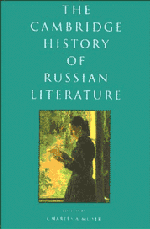Book contents
- Frontmatter
- 1 The literature of old Russia, 988–1730
- 2 The eighteenth century: neoclassicism and the Enlightenment, 1730–90
- 3 The transition to the modern age: sentimentalism and preromanticism, 1790–1820
- 4 The nineteenth century: romanticism, 1820–40
- 5 The nineteenth century: the natural school and its aftermath, 1840–55
- 6 The nineteenth century: the age of realism, 1855–80
- 7 The nineteenth century: between realism and modernism, 1880–95
- 8 Turn of a century: modernism, 1895–1925
- 9 The twentieth century: the era of socialist realism, 1925–53
- 10 The twentieth century: in search of new ways, 1953–80
- 11 Afterword: Russian literature in the 1980s
- Bibliography
4 - The nineteenth century: romanticism, 1820–40
Published online by Cambridge University Press: 28 March 2008
- Frontmatter
- 1 The literature of old Russia, 988–1730
- 2 The eighteenth century: neoclassicism and the Enlightenment, 1730–90
- 3 The transition to the modern age: sentimentalism and preromanticism, 1790–1820
- 4 The nineteenth century: romanticism, 1820–40
- 5 The nineteenth century: the natural school and its aftermath, 1840–55
- 6 The nineteenth century: the age of realism, 1855–80
- 7 The nineteenth century: between realism and modernism, 1880–95
- 8 Turn of a century: modernism, 1895–1925
- 9 The twentieth century: the era of socialist realism, 1925–53
- 10 The twentieth century: in search of new ways, 1953–80
- 11 Afterword: Russian literature in the 1980s
- Bibliography
Summary
The decades between 1820 and 1840 witnessed simultaneously the zenith of Russian romanticism and the first stages of Russian literature’s greatest period, which extended from approximately 1820 to the time of the First World War. In terms of genres, Russian romanticism began with a strong emphasis on poetry (it is appropriate that Ruslan and Lyudmila of 1820 should be a narrative poem), but in the course of its development shifted toward prose. Thus Pushkin, though he never abandoned poetry by any means, turned definitely toward prose in 1830 with the composition of his Tales of Belkin, a cycle of works which laid the foundations of the Russian short story yet to come; Gogol began his literary career with a poetic failure but soon found his place as a writer of elaborate prose; and Lermontov, in numerous ways the most characteristic figure of the romantic period, remained not only a fine poet – many think him second only to Pushkin among nineteenth-century poets – but became an excellent prose-writer as well, and it is proper that his novel, or cycle of short stories, A Hero of Our Time (1840), should mark the end of Russian romanticism, and rather decisively at that. The transition from Ruslan and Lyudmila to A Hero of Our Time marks not only a shift from an early romanticism based upon national folklore to a romanticism oriented toward the extraordinary individual, the “superfluous man,” in a social context, but also a shift from poetry to prose. And yet both works are plainly romantic in their thrust.
- Type
- Chapter
- Information
- The Cambridge History of Russian Literature , pp. 136 - 188Publisher: Cambridge University PressPrint publication year: 1992
- 1
- Cited by



